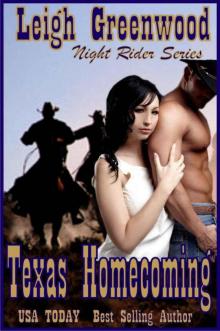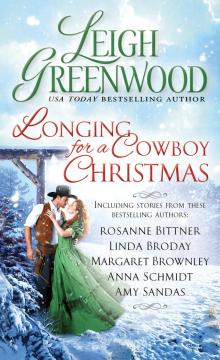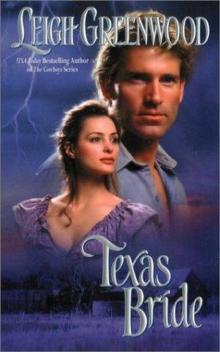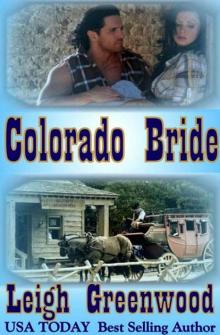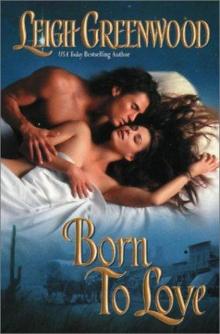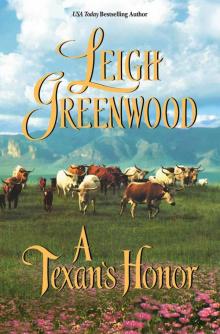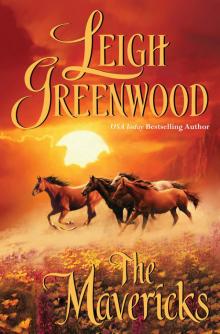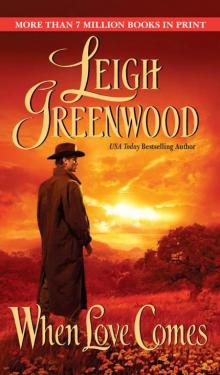Texas homecoming, p.1
Texas Homecoming, page 1
part #1 of Night Riders Series





CRITICS ARE RAVING
ABOUT LEIGH GREENWOOD!
“Leigh Greenwood NEVER disappoints. The characters are finely drawn, the plots always created with just the right amount of spice to pathos and always, always, a guaranteed good read!”
—Heartland Critiques
“Leigh Greenwood remains one of the forces to be reckoned with in the Americana romance sub-genre.”
—Affaire de Coeur
“Leigh Greenwood continues to be a shining star of the genre!”
—The Literary Times
“Leigh Greenwood is one phenomenal writer who knows the human elements of everyday living, the joys and sorrows, the power of love and the beauty of redemption.”
—Belles and Beaux of Romance
“Greenwood’s books are bound to become classics.”
—Rendezvous
“What more could we want?”
—Romantic Times
PRAISE FOR
THE COWBOYS SERIES
JAKE
“Only a master craftsman can create so many strong characters and keep them completely individualized.”
—Rendezvous
WARD
“Few authors write with the fervor of Leigh Greenwood. Once again [Greenwood] has created a tale well worth opening again and again!”
—Heartland Critiques
BUCK
“Buck is a wonderful Americana Romance!”
—Affaire de Coeur
CHET
“Chet has it all! Romance and rustlers, gunfighters and greed … romance doesn’t get any better than this!”
—The Literary Times
SEAN
“Readers will want to make space on their keeper shelves for Sean. Sean is Western romance at its finest!”
—The Literary Times
PETE
“Pete is another stroke on Leigh Greenwood’s colorful canvas of the Old West. The plotting is brilliant and the conflict strong. Reading Pete is like a bronco ride—you can’t stop until the end.”
—Rendezvous
DREW
“Sexual tension and endless conflict make for a fast-paced adventure readers will long remember.”
—Rendezvous
LUKE
“Another winner by Leigh Greenwood!”
—Romantic Times
A WARM WELCOME
“A man protects what he values. Nothing is more valuable than the woman a man loves.”
“How would you show a woman you loved her?” Pilar asked.
“Like this.” Cade took her in his arms and kissed her.
Pilar knew that some part of her must have been wanting this, hoping for it, but a part of her was shocked to find herself in Cade’s embrace. That same part was even more shocked to discover how much she wanted it, welcomed it, moved forward to meet him. Nor did she back away from the kiss when it turned from a genteel brushing of lips to an unbridled expression of pent-up emotions.
She didn’t know what was responsible for the feeling that her life had suddenly turned in a new direction, had taken on a different meaning. She didn’t know how to account for the emptiness inside her, or the conviction that Cade was the only one who could fill it.
She only knew she’d been swept up in Cade’s powerful embrace, and it was the most wonderful feeling of her whole life.
THE COWBOYS SERIES BY LEIGH GREENWOOD:
JAKE
WARD
BUCK
CHET
SEAN
PETE
DREW
LUKE
MATT
THE SEVEN BRIDES SERIES:
ROSE
FERN
IRIS
LAUREL
DAISY
VIOLET
LILY
Texas Homecoming
Leigh Greenwood
Copyright © 2002, 2012 Leigh Greenwood
Contents
Copyright
Prologue
Chapter One
Chapter Two
Chapter Three
Chapter Four
Chapter Five
Chapter Six
Chapter Seven
Chapter Eight
Chapter Nine
Chapter Ten
Chapter Eleven
Chapter Twelve
Chapter Thirteen
Chapter Fourteen
Chapter Fifteen
Chapter Sixteen
Chapter Seventeen
Chapter Eighteen
Chapter Nineteen
Chapter Twenty
Chapter Twenty-one
Chapter Twenty-two
Chapter Twenty-three
Chapter Twenty-four
Chapter Twenty-five
Chapter Twenty-six
Epilogue
About the Author
Prologue
Shenandoah, Virginia, 1864
The men formed a tight circle around a fire that was little more than glowing embers. One tossed dry moss onto the coals, and flames briefly illuminated their faces. They looked like haunted specters of the men they’d been—expressions harsh, gazes hard and unwavering, faces filmed with sweat. Ragged Confederate uniforms, the gray filthy with blood and dirt, gave no indication of the pride with which they had mounted up four days earlier. They’d spent three years protecting each other, being the family they’d left behind, but this night something less noble had drawn them together.
Revenge.
“Then it’s agreed?” The man spoke with a heavy Texas drawl. As he knelt on the ground, it was impossible to tell much about his height, but he had the aura and broad shoulders of a man born to command. His intense blue-eyed gaze moved from one man to the next around the circle. It was important that each one feel an unshakable commitment.
The men nodded their agreement.
“When do we start?” one asked.
“Where?” another wanted to know.
“They say he’s dead,” a third reminded them.
“He’s alive,” the leader said. “I can feel it.”
Nobody argued with him. His feelings had saved their lives more than once.
“A traitor like Laveau doesn’t die,” their leader said. “He has to be sought out and brought to justice. Not for ourselves, but for those who aren’t with us tonight.”
Their troop had been betrayed by one of their own. The magnitude of the treachery, the horror of so many needless deaths, had turned the survivors into vengeful men.
“What if we don’t survive the war?” one man asked. “There’s only eleven of us left.”
“Those who survive will carry on for the rest,” their leader said.
The troop had been thirty-six strong, all young, bright, eager men, proud of their abilities and reputations, impatient to add to the growing legends surrounding the Night Riders. Then they were betrayed. They had died like defenseless animals, pinned down under lethal fire on a small farm. It was a miracle any of them had survived.
But they had, and now they had a new goal, a new reason to go on living. They would finish the war—their commitment to that came first—but afterward they would seek out the man who’d robbed them of far more than the fruits of a successful raid.
“Does anybody have a Bible?” their leader asked.
A young man got up, walked a short distance away, and came back with a sword. “Use this,” he said, his voice quavering. “It was my brother’s.”
The men averted their eyes. They’d all lost something that night, but nothing so impossible to replace as a brother. The leader gripped the sword in the middle. “I swear that as long as I live I will never rest until the traitor is brought to justice.”
One after another the men stood, gripped the sword, repeated the oath.
“For my brother,” the boy from Arkansas said.
They continued until they named all the lost members of their troop.
“Remember,” their leader said. “No matter what happens, always remember.”
Chapter One
Texas, 1865
Cade Wheeler pulled his horse to a stop on the low rise that formed the north bank of the San Antonio River. At least once a day for the last four years he’d wondered if he’d ever see this stretch of country again. He’d been born here, had grown up here. He’d come to love the harsh landscape as he could never love the more gentle, greener Shenandoah Valley where he’d spent so much of the war. He loved the heat, the cactus, the thickets of thorn-bearing bushes where the wild longhorns hid. He loved the cedar and live oak-covered hills, the chalky soil, the blazing sky that burned a man’s skin the color of tanned leather.
“Good God!” Holt Price said. “Is this the country you’ve been hankering after for four years?”
“This is it.” Cade let his gaze wander over the hills like a loving caress. “This is home.”
“It looks more like hell.” Holt wiped his brow with a handkerchief. “Feels like it, too. This is September. What’s it like in the summer?”
“Hotter than the hinges of hell,” Owen Wheeler said. “Men have been known to die within sight of water.”
“He’s never set foot in Texas,” Cade said, laughing at his cousin. “You can’t believe anything he says.”
“Doesn’t look like a place friendly to a Yankee from Vermont,” Holt said.
“No place in Texas is going to be friendly to a Yankee, no matter where he comes from,” Owen said.
Holt was apolitical. He had volunteered as a doctor for the Confederacy because h
“Don’t expect anything like the big houses we saw in the valley,” Cade said, prodding his horse into motion again. They headed down a worn cattle trail to the river. Cade’s grandfather’s ranch was on the other side.
“I wasn’t expecting a mansion,” Holt said.
“Cade’ll be lucky if there’s a cow shed left standing,” Owen said. “There’s been nobody to look after the place except two old men.”
“My grandfather and his brother,” Cade said. “My family has fought three wars since we came to Texas. There’s not many of us left.”
“But that’s how you got your land, wasn’t it?” Holt asked. “Fighting for Texas independence in 1836, then to join the United States in 1848?”
“That and a little bit of thievery.”
“The spoils of war,” Owen said. “You can’t expect people to fight for nothing.”
Cade didn’t, but in this case it might have been easier if he hadn’t known the people from whom his family had taken the land. It didn’t bother his grandfather. It hadn’t bothered his father either, but it had always bothered Cade. Until now.
The fourth person in the group spoke for the first time. “The strong always take from the weak.”
Rafe Jerry usually contributed little to their conversations, and what he did contribute was generally gloomy. Something had made him bitter and cynical, but he didn’t talk about his previous life. Not even Owen had asked. Rafe just wasn’t the kind of person you asked personal questions.
“We got to go through a lot of rivers?” Holt asked as they descended the trail, dust spiraling up under their horses’ hooves. Holt said people in Vermont built bridges over creeks and rivers.
“We don’t believe in bridges in Texas,” Cade said. “Flash floods just wash them out.”
Holt’s uneasiness disappeared moments later. “You call this a river?” He urged his horse into the shallow trickle that was the San Antonio River in late summer.
“If we had as much rain as you get in Vermont, this wouldn’t be cow country.” Cade wasn’t blind to the differences between Texas and the rest of the country, but he was tired of Holt complaining about them. It had been a long ride from Virginia. “Wait until you see it after a heavy winter rain.”
“Will it take that long to find Laveau?” Owen asked.
“I don’t know,” Cade said. “He may not have come home yet.”
“He doesn’t need to come home,” Holt said, “not after stealing Ivan’s money.”
Laveau diViere had grown up on the neighboring ranch, but he and Cade had been separated by a long-standing family quarrel. After the Texas war of independence in 1836, Cade’s grandfather had carved his Wheeler 36 ranch out of land Laveau’s Spanish grandmother had inherited. Cade’s father had taken still more during the Mexican war, claiming the diViere grant wasn’t legal under Texas law. The diVieres tried to prove their claim in court, but Texas courts rarely upheld Spanish grants.
Laveau and Cade had joined the Confederate Army when war broke out in 1861. Because of their backgrounds, they’d been chosen to be part of a mounted troop specializing in night raids, their targets primarily ammunition depots, payroll wagons, railroads, or supply trains. They rode in, struck, and rode out on the same night. They had been remarkably successful until Laveau betrayed them to the Union.
The Union casualty list showed Laveau among the dead, but no one remembered seeing Laveau right before the attack, and afterward two horses had been missing along with Ivan’s money.
“He’ll come home,” Cade said as his horse lunged up the opposite bank of the river. “I figure what he did is tied to getting the Union Army to recognize his grandmother’s grant.”
“How can they help him in Texas?”
“Once the Army takes control, they’ll have the power to do anything they want,” Cade said.
Cade had taken a route that kept them west of the towns where troops were stationed, but the Wheeler ranch was close to San Antonio, where he was certain there would be soldiers.
“I don’t see many cows,” Owen said.
As they rode through the hilly, dry country west of the San Antonio River, Cade kept a careful watch for the cows that were his family’s only source of income. “They prefer to bed down in the thickets during the day and graze at night.”
“They’re smarter than we are,” Holt said. “Why don’t we find us a nice, big shade tree and wait until this killing heat is gone before continuing to your hacienda in the desert?”
“I don’t live on a hacienda,” Cade said, “and this isn’t desert.”
“You couldn’t prove it by me. I hope your house is close to that miserable trickle you call a river.”
“It’s close to a stream that empties into the river.”
“Which you said is dry most of the year,” Owen reminded him.
“We have a well,” Cade said. “You don’t have to worry you’ll die of thirst.”
“I’m sure I won’t,” Holt said. “I’ll die of heat stroke first.”
“This isn’t half as hot as the battlefield at The Wilderness.”
As tired as he was of the complaining, Cade immediately regretted he’d mentioned that horrific battle. The smoke at The Wilderness had been so thick, soldiers on neither side could tell whether they were firing at the enemy or their own men. Dry underbrush and trees had caught fire. Cade could still hear the cries of the wounded as they perished in the smoke and flames.
The complaining ceased, and the men fell into a silence bred of long-standing companionship.
“There’s the house,” Cade said half an hour later.
A roofline was visible over the tops of live oaks that surrounded the ranch buildings. Cade resisted the impulse to kick his mount into a gallop. He’d been patient for four months. He could be patient a little while longer.
“I hope you’ve got lots of shade trees,” Holt said.
“We don’t believe in shade in Texas,” Cade said, grinning. “Trees use up too much water.”
Owen pulled up alongside Cade. “Race you to the house.”
“Not on these horses. Wait until we catch up some of the old ranch stock.”
The four mares they rode were Virginia and Carolina bred with some thoroughbred and Morgan blood. Cade had traded with members of the cavalry until he got the best horses he could find. They’d make poor cow ponies, but they’d be good bloodstock for the future.
They broke from the thick brush onto a trail through the range that led to the ranch.
“Anybody left at the place?” Owen asked.
“Don’t know.” Cade’s grandfather wasn’t one to write.
“Squatters?” Rafe asked.
“Could be,” Cade replied. They were all silent for a moment. They knew what that could mean.
Laveau had always blamed Cade for any trouble that befell his family. When he got the letter telling him squatters had taken over his ranch, he jumped Cade. When Cade wanted to know what happened to Laveau’s sister and grandmother, Laveau exploded into curses, would hardly speak to him after that.
Cade hadn’t seen many signs of cows other than worn paths through the brush and trails to water, but he hadn’t seen the carcasses that would be evidence of cows killed on the range, the best cuts of beef taken away, the rest left to rot. He hoped his grandfather was still alive. Cade disagreed with the old curmudgeon in just about every way possible, but he was fond of him. Cade’s father had died years before, and his mother had abandoned him. His grandfather was about the only family Cade had left.
“Stop right where you are,” a voice called from the post oak thicket that crowded the trail as it dipped into a dry creek bed. “One step farther, and I’ll put a bullet through your brisket.”
The voice didn’t sound exactly like he remembered, but it was close enough to cause a smile to curve Cade’s lips.
“Let’s rush him,” Owen half whispered.
“And if he can’t, I can well enough,” came a voice from the brush on their other side.
“Damnation!” Owen said. “I didn’t come all the way to Texas to die in a crossfire.”
The second voice was even more changed, but Cade was sure his uncle and grandfather were in the brush, determined to defend their ranch against invaders.
Cade looked over his shoulder. Holt waited, but Rafe had melted into the thick brush. Cade’s grandfather obviously didn’t recognize his grandson, and he’d never seen Cade’s friends. As far as he knew, they were dangerous strangers.

